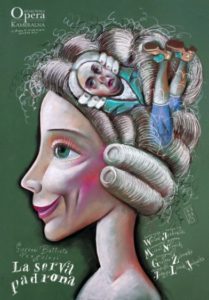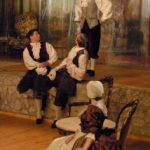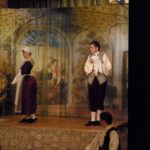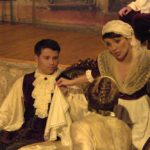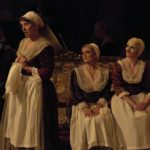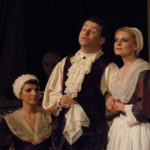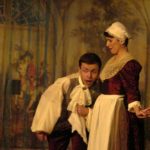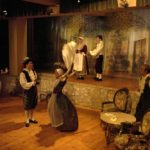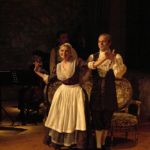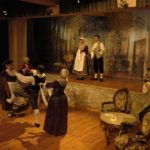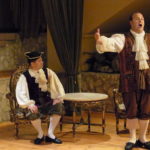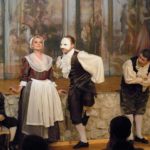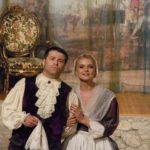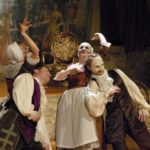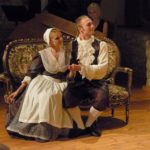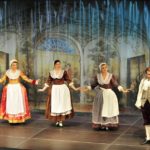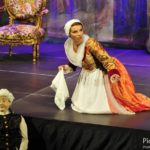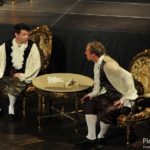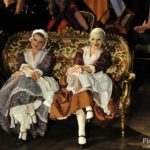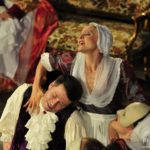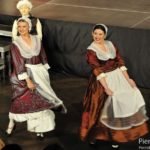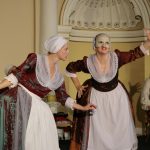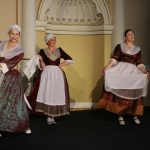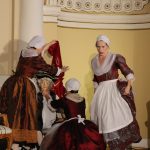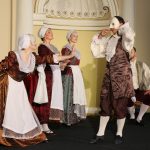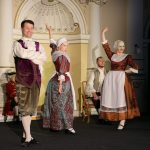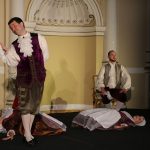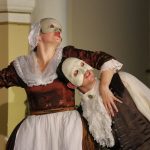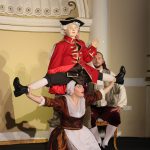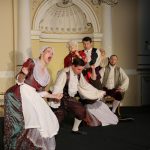Credits
Staging, direction: Wacław Jankowski
Musical direction: Michał Łukasz Niżyński
Scenography, costumes, puppet project: Grażyna Żubrowska
Stage movement: Jadwiga Leśniak-Jankowska
Serpina
Sylwia Frączek (soprano)
Anna Bugajska
Anna Warchał
Uberto
Adrian Janus (bas)
Kamil Joński
Maciej Rutkowski
Vespone (personaggio muto)
The Krakow Chamber Opera Orchestra:
Conductor: Paweł Szczepański
Violin I – Barbara Szpakiewicz
Violin II -Maria Gawlik
Viola – Kinga Szczepanik
Cello – Agnieszka Filimowska
Double bass – Lesław Wydrzyński
Harpsichord – Paulina Tkaczyk – Cichoń
Making a doll: Rafał Budnik
Making masks: Ryszard Hodur
Photos
fot. Agnieszka Łoboda, Paweł Zechenter
July 26, 2014, Open Art Festival, Guest House in Szczawnica
fot. Janusz Wojtarowicz
54th Festival of Jan Kiepura in Krynica-Zdrój
Friday, 13th August 2020
fot. Dawid Kostek
Reviews
Let’s do our job – the jubilee of Kraków Chamber Opera
The latest premiere of the Kraków Chamber Opera was a special event – it marked the twenty years of its activity. (…) the significant collection of Opera’s prizes was enlarged by the symbolic Key to the City present by the president of Kraków. The play chosen for the jubilee was the comic opera La serva padrona by Pergolesi, whose works were staged in Kraków Chamber Opera before (e.g. Stabat Mater or opera Livietta e Tracollo). La serva padrona was a breakthrough in the history of music; staged for the first time in 1733 as an intermezzo between the acts of the opera seria Il prigionier superbo (also composed by Pergolesi), it soon became and independent and outshined the serious clou of the programme. Before, such “unserious” musical scenes written for basso buffo, soprano and a actor or actors in the silent roles were only staged as intermezzos between the acts of opera seria. Therefore, La serva padrona became a bone of contention between the French buffonists (the supporters of the new genre gathered around the queen, including the encyclopedists – Denis Diderot and Jean Jacques Rousseau) and the anti-buffonists (the defenders of the French high art, lead by the king and Madame de Pompadour).
The performance, directed and staged by Wacław Jankowski, is a quintessence of style and taste of the Kraków Chamber Opera artists. It employed the proven model of multiplying the cast, improved by the charming puppets from the Rabcio Puppet Theatre. Each of the two protagonists is thus represented in four ways: by the singer, two actors and the puppet. Traditionally, apart from the vocal parts, actors perform the libretto in Polish translation. Thus the highly amusing though trifle story of the smart maid terrorising her master (in the finale – a husband) became a theatre of precision and finesse matching the taste of Madame de Pompadour and the naturalness and lightness postulated by Rousseau. Concerning the latter: the usage of puppets in The Servant Turned Mistress is all the more justified if we remember about the spectacular burning of the puppet of the leader of the “jesters”.
The comical and psychological potential of Gennaro Antonio Federico’s libretto was utilised amazingly thanks to the stylish moves and gestures of the characters (directed by Jadwiga Leśniak-Jankowska) and the puppet animation. Probably the greatest asset of the performance was the presentation of the underlying flirt between the soubrette and her Pantalone, full of eroticism. Among the various commedia dell?arte tricks, one especially memorable is the “scene of horror” starring Captain Tempest, in which the puppet (which is the only representation of that silent character) gives a display of Eastern martial arts. Congratulations are due to the actors (Martyna Malcharek and Katarzyna Pędzimąż as Serpina and Piotr Serafin and Cezary Skrocki as Uberto), who, apart from great acting skills, shined at animation. Grażyna Żubrowska should also be applauded for the charming and stylish decorations – though we are already used to that in this theatre. The young singers, Anna Filimowska-Wolfinger (Serpina) and Andrzej Nowicki (Uberto), performed their parts with confidence and character as well as grandeur (except for a few shortcomings), and the orchestra conducted by Michał Niżyński played with a feeling and energy. The last “frame” of the performance is a doll-house, in which the miniature characters spin on the merry-go-round, accompanied by a musical box. The world outside speeds forward – as always. Suddenly, I remember the old, wise song by Wojciech Młynarski: “Róbmy swoje” (“Let’s do our job”)…
Monika Partyk
Ruch Muzyczny, nr 3 5 February 2012
**********************************
The prize for the brave
…the weather wasn’t particularly inviting for leaving the warm, homely comfort, yet the prize awaited for those who decided to come…
Those who visited the Kraków Chamber Opera on Sunday enjoyed themselves at the premi?re of Giovanni Batista Pergolesi’s La serva padrona, prepared by Wacław Jankowski (staging and direction), Jadwiga Leśniak-Jankowska (choreography and stage movement), Michał Niżyński (musical direction) and Grażyna Żubrowska (decorations, costumes) for the jubilee of the stage.
For years now the Jankowski marriage have realised their vision of theatre of word an music, with a perfect balance between individual elements, all of them serving to convey the clear message of the work and all faithful to the aesthetic standards of the time the work was created. Their performances are always perfect in every detail, logical and visually charming. The artists are mostly young people, still learning their craft. The Sunday premiere perfectly fitted those assumptions. La serva padrona in Wacław Jankowski?s staging was as much an opera as theatrical burlesque, each of the two characters from the libretto was represented fourfold, as the singers were accompanied by the actors presenting the plot and this time, additionally, by the puppets (the effect of cooperation with the “Rabcio” puppet theatre). The consistency of the director and the choreographer and the precision of artists made the performance really enjoyable for the audience.
The score of Pergolesi’s opera is very demanding for the musicians. The small instrumental section (with single castings for instruments) of the Kraków Chamber Opera, directed by Michał Niżyński, fulfilled its tasks well. Anna Filimowska-Wolfinger as Serpina and Andrzej Nowicki as Uberto are still at the beginning of their artistic careers and still face a lot of work on the vocal technique (especially Andrzej Nowicki) – but they are on the right track.
The jubilee included the words of thanks for the twenty years of activity from the city and voivodship authorities. President of Kraków gave a symbolic Key to the City to Mr. and Mrs. Jankowski.
Anna Woźniakowska
Dziennik Polski
20 January 2012
**********************************
“La serva padrona” (“The Maid Turned Mistress”) – a comic opera by Pergolesi in staging of the Krakow Chamber Opera was shown yesterday on the stage of the Old Spa House as a part of the afternoon concerts. It was a very interesting, costumed performance and the only one at the festival which showed singing from the Baroque period. Light, fun, staged with an idea (directed and staged by Wacław Jankowski, choreography and visual art of the stage movement by Jadwiga Leśniak-Jankowska). This comic operatic intermezzo tells the story of a clever maid who forced her master to marry her, all with beautiful music performed by an instrumental ensemble led by Paweł Szczepański. The performance referred to the convention of the comedy dell’arte, which was visible in the actors’ movement: gestures, steps; but also in masks and in the way of delivering the text. Two stage characters were performed by six people, three for each. The role of Serpina was played by: Sylwia Frączek – soprano, Anna Bugajska – actress, Anna Warchał – actress, and as Ubert: Mirosław Gotfryd – bass, Kamil Joński – actor, Maciej Rutkowski – actor.
Agnieszka Malatyńska-Stankiewicz
54th Festival of Jan Kiepura in Krynica-Zdrój

